★★★★
“Touched by an angel.”
 British television was rather late to the policewoman party. The first such American show, Decoy, had aired in 1957, and been followed in the seventies by Get Christie Love! and Police Woman. But the UK had to wait until the eighties for their first home-grown series. The Gentle Touch just beat Juliet Bravo to the title, beginning its five season run four months earlier, in April 1980. It centered on Maggie Forbes (Gascoine), a Detective Inspector who worked out of the Seven Dials station in central London. The show began with the murder of her husband, also a police officer, leaving her to raise teenage son Steve (Rathbone), despite a strong devotion to her career in law enforcement.
British television was rather late to the policewoman party. The first such American show, Decoy, had aired in 1957, and been followed in the seventies by Get Christie Love! and Police Woman. But the UK had to wait until the eighties for their first home-grown series. The Gentle Touch just beat Juliet Bravo to the title, beginning its five season run four months earlier, in April 1980. It centered on Maggie Forbes (Gascoine), a Detective Inspector who worked out of the Seven Dials station in central London. The show began with the murder of her husband, also a police officer, leaving her to raise teenage son Steve (Rathbone), despite a strong devotion to her career in law enforcement.
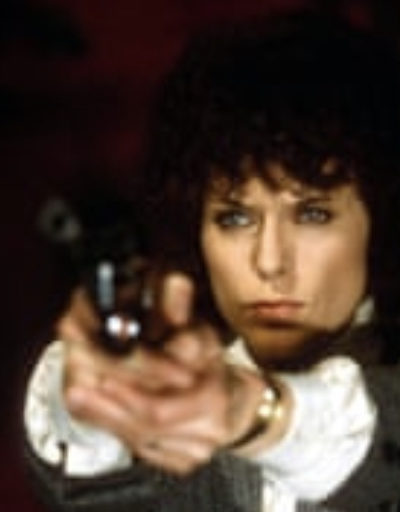 To be honest, it’s more character- than action-driven overall, yet that’s its strength, since it does a great job of creating people who feel “real”. Nobody here is perfect: everyone has flaws, and struggles to cope with life’s ups and downs. Maggie is the focus, having to operate in an era when casual disregard for a woman’s talents was the norm. Not least by her Scottish colleague, Bob Croft (Gwaspari), though he eventually came to appreciate her many talents, such as Forbes’s fierce devotion to justice. Fortunately, her boss, Detective Chief Inspector Bill Russell (Marlowe) always had her back, even if his approach means cutting her no slack either. But every episode seemed to have one or more great performance, taking advantage of the vast pool of top-tier British character actors.
To be honest, it’s more character- than action-driven overall, yet that’s its strength, since it does a great job of creating people who feel “real”. Nobody here is perfect: everyone has flaws, and struggles to cope with life’s ups and downs. Maggie is the focus, having to operate in an era when casual disregard for a woman’s talents was the norm. Not least by her Scottish colleague, Bob Croft (Gwaspari), though he eventually came to appreciate her many talents, such as Forbes’s fierce devotion to justice. Fortunately, her boss, Detective Chief Inspector Bill Russell (Marlowe) always had her back, even if his approach means cutting her no slack either. But every episode seemed to have one or more great performance, taking advantage of the vast pool of top-tier British character actors.
If you’re familiar with British films and television of the time (and I basically grew up with them!), you will see a lot of recognizable faces. Josh Ackland, Enn Reitel, Joanne Whalley, Art Malik, David Kelly, Ralph Bates and even Floella Benjamin – now Baroness Benjamin, then playing a high-class call-girl! The show also covered a lot of social topics not often seen on eighties television, from racism to porn, yet generally managed to do so without feeling like it was delivering a lecture. There’s no denying its success at the time. This peaked with the ninth episode of season three, in January 1982, which was the fifth most-watched TV program of the year in the United Kingdom, seen by almost a third of the entire population.
The odd episode does perhaps teeter on the edge of implausibility, such as a largely ineffective cliffhanger at the end of season four, where a woman walks into Seven Dials station, armed with a hand-grenade, and threatening to blow herself up. Such excesses seemed positively… well, American. I felt the show was better when staying safely British: you could have a good drinking game, based off people offering each other a nice cup of tea. Speaking of which, Gascoine must have had a sponsorship deal with artificial sweetener company Hermesetas: Chris noticed the way she inevitably dropped a couple of their little tabs into her cuppa. Yet I was surprised how well it generally stood the test of time. Its age only occasionally shows, and most of its 56 episodes proved highly watchable, thanks to the solid characters and performances.
Creator: Terence Feely
Star: Jill Gascoine, William Marlowe, Brian Gwaspari, Nigel Rathbone





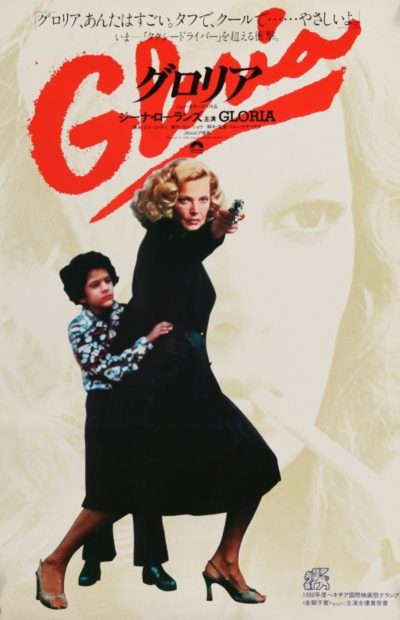 Yeah, I’ll confess to having Laura Branigan’s eighties hit running through my head on repeat almost the entire movie, even if its lyrics can only be tangentially tied to it. What also struck me is how strong of an influence this was on Luc Besson’s Leon, especially at the beginning. I mean: a criminal gang takes out an entire family in a New York tenement, except for one child, as punishment for the father having tried to steal from them. That survivor takes refuge with a very reluctant neighbour with mob ties, who then has to protect the child as they move about the city. There’s even a scene where one of the gang fires his gun at a nosy resident.
Yeah, I’ll confess to having Laura Branigan’s eighties hit running through my head on repeat almost the entire movie, even if its lyrics can only be tangentially tied to it. What also struck me is how strong of an influence this was on Luc Besson’s Leon, especially at the beginning. I mean: a criminal gang takes out an entire family in a New York tenement, except for one child, as punishment for the father having tried to steal from them. That survivor takes refuge with a very reluctant neighbour with mob ties, who then has to protect the child as they move about the city. There’s even a scene where one of the gang fires his gun at a nosy resident.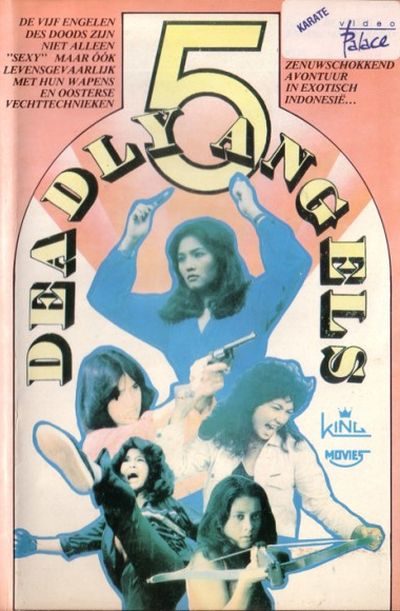 Difficult though it is to believe, a film containing the remarkable line of dialogue above still manages, largely, to be dull and uninteresting. Charlie’s Angels has a lot to answer for, spawning a slew of knock-offs and imitators as a result of its success, all over the world. In this case, the origin is Indonesia, where scientist Hardy has just discovered a new kind of super-explosive. He’s worried about it falling into the wrong hands, and rightfully so, as he and girlfriend Yanti (Octavia) are kidnapped by the evil Mr. Brutho. Yanti is able to escape, although Brutho – who goes through minions like the rest of us go through socks – plans to kidnap her mother and little sister. The aim is to use them as leverage (which is where we get the tag-line) and force Hardy to make his new explosive, for sale to a Middle Eastern potentate.
Difficult though it is to believe, a film containing the remarkable line of dialogue above still manages, largely, to be dull and uninteresting. Charlie’s Angels has a lot to answer for, spawning a slew of knock-offs and imitators as a result of its success, all over the world. In this case, the origin is Indonesia, where scientist Hardy has just discovered a new kind of super-explosive. He’s worried about it falling into the wrong hands, and rightfully so, as he and girlfriend Yanti (Octavia) are kidnapped by the evil Mr. Brutho. Yanti is able to escape, although Brutho – who goes through minions like the rest of us go through socks – plans to kidnap her mother and little sister. The aim is to use them as leverage (which is where we get the tag-line) and force Hardy to make his new explosive, for sale to a Middle Eastern potentate. Released in 1980, it was only the previous year – as an opening caption tells us – that women were allowed into the Greek police force. So this obscurity [hence the low-quality images, for which I apologize!] was perhaps the first Hellenic entry in our genre. The heroine is Daisy Alexiou (Karlatou, best-known for playing Prince’s mother in Purple Rain), one of the first batch of policewomen, whom we first see in an introductory training montage. Initially assigned to traffic duty, her role in chasing and capturing a bank robber quickly gets her assigned to narcotics. Which is fine with her: she has a strong anti-drug streak, due to the personal impact it has had on her, proclaiming, “It is a disgusting disease, that kills people and rots their society.” Given this, I was wryly amused to see Daisy smokes like a chimney. Hey, it was the eighties…
Released in 1980, it was only the previous year – as an opening caption tells us – that women were allowed into the Greek police force. So this obscurity [hence the low-quality images, for which I apologize!] was perhaps the first Hellenic entry in our genre. The heroine is Daisy Alexiou (Karlatou, best-known for playing Prince’s mother in Purple Rain), one of the first batch of policewomen, whom we first see in an introductory training montage. Initially assigned to traffic duty, her role in chasing and capturing a bank robber quickly gets her assigned to narcotics. Which is fine with her: she has a strong anti-drug streak, due to the personal impact it has had on her, proclaiming, “It is a disgusting disease, that kills people and rots their society.” Given this, I was wryly amused to see Daisy smokes like a chimney. Hey, it was the eighties…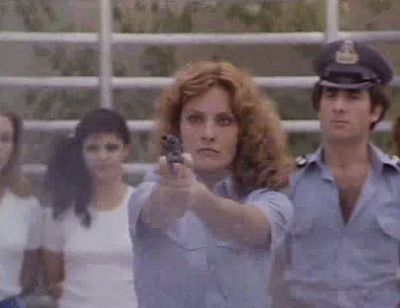 Considering this is nearer four decades old than three, it has stood the test of time surprisingly well. Alexiou doesn’t mess around, happily hurtling into danger without a second thought, and proves generally competent, save for an ill-advised undercover operation, which ends badly and seems to exist largely so we can see Karlatou dressed as a hooker. Outside of the cigarette use (so rampant it feels like Marlboro were one of the producers), the most dated thing here is probably Daisy and Markos having a romantic relationship, in total violation of every boss-subordinate protocol. But both the story and characters still feel reasonably contemporary, and Karlatou carries herself effectively.
Considering this is nearer four decades old than three, it has stood the test of time surprisingly well. Alexiou doesn’t mess around, happily hurtling into danger without a second thought, and proves generally competent, save for an ill-advised undercover operation, which ends badly and seems to exist largely so we can see Karlatou dressed as a hooker. Outside of the cigarette use (so rampant it feels like Marlboro were one of the producers), the most dated thing here is probably Daisy and Markos having a romantic relationship, in total violation of every boss-subordinate protocol. But both the story and characters still feel reasonably contemporary, and Karlatou carries herself effectively.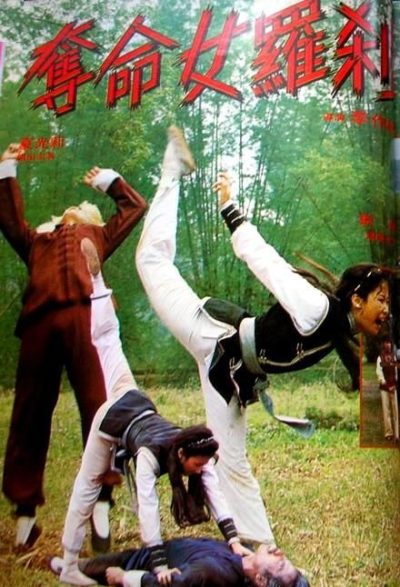
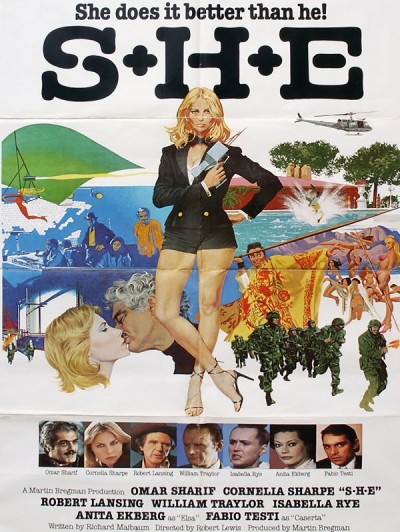
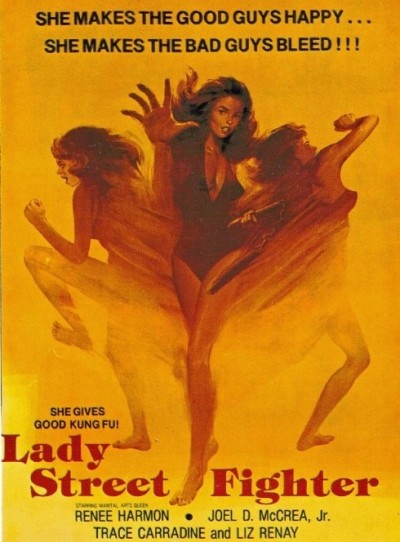 Let me start off by repeating myself, in case you missed it, because I want to be absolutely clear on these points. This is legitimately terrible. This is among the worst films I’ve ever seen. And I speak as someone with over 25 years of watching really bad films. That half-star is solely for amusement to be gathered from how bad this is, because there are basically no redeeming features here at all, and I speak as someone who will tolerate almost any pile of shit with an action heroine in it. This movie is largely responsible for the addition of the word “almost” to the previous sentence, despite being mercifully brief at a mere 72 minutes in length. The half-star is simply because I did reach the end without gnawing a limb off to escape. I think I deserve some kind of Internet prize for that.
Let me start off by repeating myself, in case you missed it, because I want to be absolutely clear on these points. This is legitimately terrible. This is among the worst films I’ve ever seen. And I speak as someone with over 25 years of watching really bad films. That half-star is solely for amusement to be gathered from how bad this is, because there are basically no redeeming features here at all, and I speak as someone who will tolerate almost any pile of shit with an action heroine in it. This movie is largely responsible for the addition of the word “almost” to the previous sentence, despite being mercifully brief at a mere 72 minutes in length. The half-star is simply because I did reach the end without gnawing a limb off to escape. I think I deserve some kind of Internet prize for that.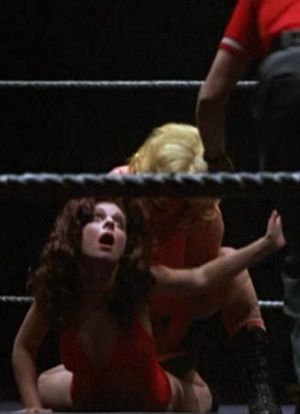 Rosa Rubinsky (Baff) is working as a waitress at a wrestling venue, when her swift dispatch of an over-affectionate coworker gets her noticed by a promoter (Bechler). He convinces her to try out, under the watchful eye of Mildred Burke [playing herself – she held the Women’s World Championship for about 20 years], and after some initial shock, discovers she likes the theatrical sport. Despite never having been outside the state of New York, she goes on the road, along with a set of other women wrestlers, and they travel up and down the East coast, putting on shows, though Rosa is still deemed too “green” to get in the ring. That changes after she meets the current women’s champion, Terrible Tommy (O’Brien, another genuine wrestler of the era). A bout for the belt is arranged, in which Rosa – known now as “Rosa Carlo, the Mexican Spitfire” – will take on Tommy for the title.
Rosa Rubinsky (Baff) is working as a waitress at a wrestling venue, when her swift dispatch of an over-affectionate coworker gets her noticed by a promoter (Bechler). He convinces her to try out, under the watchful eye of Mildred Burke [playing herself – she held the Women’s World Championship for about 20 years], and after some initial shock, discovers she likes the theatrical sport. Despite never having been outside the state of New York, she goes on the road, along with a set of other women wrestlers, and they travel up and down the East coast, putting on shows, though Rosa is still deemed too “green” to get in the ring. That changes after she meets the current women’s champion, Terrible Tommy (O’Brien, another genuine wrestler of the era). A bout for the belt is arranged, in which Rosa – known now as “Rosa Carlo, the Mexican Spitfire” – will take on Tommy for the title.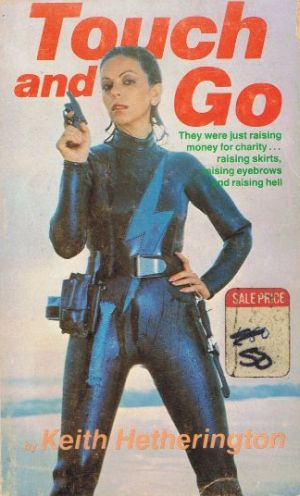 This 1980 film was originally called Friday the Thirteenth, but went through a title change in production, after they discovered some other film with that title being made… No hockey-masks to be seen here: instead, it’s the story of three young women, Eva (Hughes), Fiona (Contouri) and Millicent (Duncan), who start robbing places, largely for amusement – they donate the proceedings to an orphanage. However, after one of their victims ends up making far more money than they do, thanks to a bogus insurance claim, they switch targets and set their sights on a bigger fish, in the shape of a luxury hotel which contains a bank, jewellery store and other treats. This requires expanding their team, but with larger hauls come larger risks, as they find out, even once the actual crime has been carried out.
This 1980 film was originally called Friday the Thirteenth, but went through a title change in production, after they discovered some other film with that title being made… No hockey-masks to be seen here: instead, it’s the story of three young women, Eva (Hughes), Fiona (Contouri) and Millicent (Duncan), who start robbing places, largely for amusement – they donate the proceedings to an orphanage. However, after one of their victims ends up making far more money than they do, thanks to a bogus insurance claim, they switch targets and set their sights on a bigger fish, in the shape of a luxury hotel which contains a bank, jewellery store and other treats. This requires expanding their team, but with larger hauls come larger risks, as they find out, even once the actual crime has been carried out.